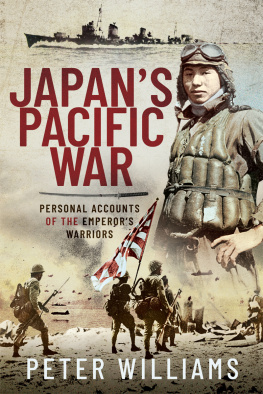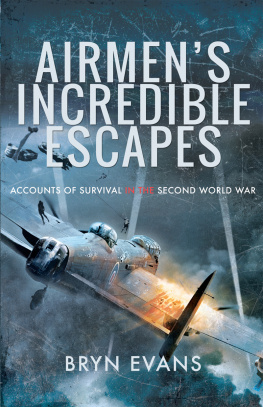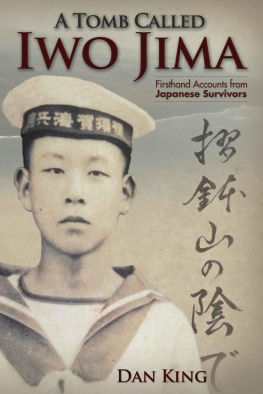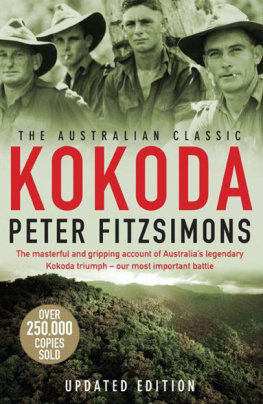Pagebreaks of the print version

Japans Pacific War
Dedication
This book is dedicated to Major Masao Horie, Imperial Japanese Army
Japans Pacific War:
Personal Accounts of the Emperors Warriors
Peter Williams
First published in Great Britain in 2021 by
Pen & Sword Military
An imprint of
Pen & Sword Books Ltd
Yorkshire Philadelphia
Copyright Peter Williams 2021
ISBN 978 1 52679 612 7
eISBN 978 1 52679 613 4
Mobi ISBN 978 1 52679 614 1
The right of Peter Williams to be identified as Author of this work has been asserted by him in accordance with the Copyright, Designs and Patents Act 1988.
A CIP catalogue record for this book is available from the British Library.
All rights reserved. No part of this book may be reproduced or transmitted in any form or by any means, electronic or mechanical including photocopying, recording or by any information storage and retrieval system, without permission from the Publisher in writing.
Pen & Sword Books Limited incorporates the imprints of Atlas, Archaeology, Aviation, Discovery, Family History, Fiction, History, Maritime, Military, Military Classics, Politics, Select, Transport, True Crime, Air World, Frontline Publishing, Leo Cooper, Remember When, Seaforth Publishing, The Praetorian Press, Wharncliffe Local History, Wharncliffe Transport, Wharncliffe True Crime and White Owl.
For a complete list of Pen & Sword titles please contact
PEN & SWORD BOOKS LIMITED
47 Church Street, Barnsley, South Yorkshire, S70 2AS, England
E-mail:
Website: www.pen-and-sword.co.uk
Or
PEN AND SWORD BOOKS
1950 Lawrence Rd, Havertown, PA 19083, USA
E-mail:
Website: www.penandswordbooks.com
Preface
I n 1984 I met Sakatoshi Mori, who had interrogated prisoners during the Second World War, and Yukiko Ueno who hosted farewell parties for kamikaze pilots. I was living in Japan teaching English conversation to retired Japanese and they were two of my students.
Sakatoshi appeared to me then to be an old man. He was in his early sixties, my age now. He told me that he was conscripted in 1941, when he was a journalist for the Japan Times , an English language newspaper. He kept quiet about his fluent English because it was the enemys language. When the army discovered his ability they gave him a job interrogating prisoners of war. Sakatoshi was at pains to point out that he didnt do the torturing. The other man on the team did that, then the prisoner was moved to another room, where Sakatoshi offered a smoke and a chat. I was not sure what to make of this friendly old bloke, nattering away about Burma and the great times he had there as a lad.
Nineteen years old in 1945, Yukiko Ueno was a waitress at Takamotoya Ryokan, a hotel where the graduates of special attack training had a last party before being posted to a kamikaze squadron. When it closed as a hotel, Takamotoya became the English language school I taught in. Yukiko took me down the corridor and showed me the room where the farewell parties were held. Takamotoya, built in 1830, was not holding up well. There were holes in the walls and the tatami mats looked worn enough to be the same ones the pilots had sat on 39 years before.
Yukiko explained how much she admired those men. They were volunteers, she said. They knew what they were doing and they did it gladly for their country. At the end of the party, well oiled, they all stood and shouted Banzai! Later I went back to that room and stood there trying to imagine the scenes she described.
The beginning of this book was there, in Takamotoya. I realised the town, Nakatsu, was full of veterans; the postmans father; my dentist; the owner of my favourite drinking hole. I asked if I could interview them, starting with pen and paper and progressing to a cassette recorder when I could afford one. Some were pleased to talk about the war, others were not, quoting an old Japanese saying that defeated soldiers should keep quiet about their experiences. A few agreed to meet on condition I didnt publish their words until they died. Another asked me to use anonymous instead of his name, and two more gave me a name they preferred I use instead of their own.
I left Japan after four years, but interviews continued. Japanese friends would contact a veteran organization to find those who had been at battles I was interested in and wed go together to interview them when I made one of my return trips. This led to countrywide travel and the purchase of many cakes: in Japan the visitor should arrive with a gift, and a cake is always acceptablesponge with a cream layer worked for me. I took cake by foot, bicycle, car, tram and train to one hundred addresses in Hokkaido, Honshu, Shikoku and Kyushu.
The interview was usually held in the veterans house, though some wanted a first meeting on neutral ground, normally a restaurant, to size up the foreigner. Most veterans I saw more than once, and a few became friends I would drop in to see when I couldmore cakes. The relationships formed over time helped me to obtain more candid responses to my questions than those of any other veteran interviews Ive seen.
The questions I asked focused on the experience of battle: what was it like, what exactly did you do and what did you think about it? What did you think of the enemy; their weapons; their tactics; their courage? There were other questions too, about comrades, conditions in the theatre of war, family, the atomic bombs and the lives they led in Japan before and after the war.
Having heard the stories of my fathers generation, I had an unfavourable opinion of the Japanese when I first went to Japan. The Australian veterans told me, when I was a child in Tasmania in the 1960s, that Japanese soldiers were cannibals who also tortured and executed prisoners. Most Japanese soldiers didnt do those things, but some of the stories which follow confirm that what I heard as a child is not entirely without foundation.
Another thing readers may find unsavoury is Japanese veterans expressing uncomplimentary opinions about Westerners fighting prowess or, to our eyes, unbecoming pride in having served their Emperor in, to them, a noble cause. Ive interviewed hundreds of Allied war veterans too, and just like them the Japanese vary widely in their opinions. Not all are disparaging of the enemy or proud of their own service: Air ace Kazuo Tsunoda believed that the Australians were a worthy enemy and Hajime Nishio was ashamed of Japans war of conquest and his part in it.
This is not an analytical book. It contains what over forty veterans told me, together with my brief explanations placing the battles they fought in context. I make no moral judgements about the sometimes shocking stories here. I just asked questions and recorded the answers.
What all these men have in common is that they fought against Australians on land, sea, or in the air. I am Australian, so I was particularly interested in interviewing the men who fought against the veterans Id known when I was young; the friends of my father; my school teachers; my bosses. However, now my task is done I dont think its very important who these Japanese men fought; this book provides an insight into how Japanese veterans behaved in wartime and what they thought, regardless of whom they were fighting. For almost all of them their battles against Australians was only one part of their warthey also fought Chinese, Russians, British, Americans and Dutch. Few cared who they were fighting.












